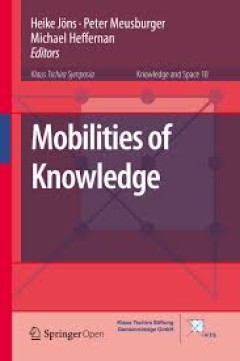Filter by

Geographies of Schooling
This open access book explores the complex relationship between schooling as a set of practices embedded in educational institutions and their specific spatial dimensions from different disciplinary perspectives. It presents innovative empirical and conceptual research by international scholars from the fields of social geography, pedagogy, educational and social sciences in Germany, the United…
- Edition
- -
- ISBN/ISSN
- 978-3-030-18799-6
- Collation
- XII, 359
- Series Title
- Knowledge and Space (KNAS, volume 14)
- Call Number
- 334 GEO

Knowledge for Governance
This open access book focuses on theoretical and empirical intersections between governance, knowledge and space from an interdisciplinary perspective. The contributions elucidate how knowledge is a prerequisite as well as a driver of governance efficacy, and conversely, how governance affects the creation and use of knowledge and innovation in geographical context. Scholars from the fields of …
- Edition
- -
- ISBN/ISSN
- 978-3-030-47150-7
- Collation
- XIII, 469
- Series Title
- Knowledge and Space (KNAS, volume 15)
- Call Number
- 334 KNO

Urban Living Lab for Local Regeneration
This open access book provides an integrated overview of the challenges and resources of large-scale social housing estates in Europe and outlines possible interdisciplinary approaches and tools to promote their regeneration. It especially focuses on the tool of urban living labs, as promising in promoting new and more effective local governance and in including the different actors into the pl…
- Edition
- 1
- ISBN/ISSN
- 978-3-031-19748-2
- Collation
- oer.unej.ac.id
- Series Title
- The Urban Book Series
- Call Number
- 550

Knowledge and Networks
This open access book bridges the disciplinary boundaries within the social sciences to explore the role of social institutions in shaping geographical contexts, and in creating new knowledge. It includes theorizations as well as original empirical case studies on the emergence, maintenance and change of institutions as well as on their constraining and enabling effects on innovation, entrepren…
- Edition
- -
- ISBN/ISSN
- 978-3-319-45023-0
- Collation
- XII, 386
- Series Title
- Knowledge and Space (KNAS, volume 13)
- Call Number
- 334 KNO

Knowledge and Institutions
This open access book bridges the disciplinary boundaries within the social sciences to explore the role of social institutions in shaping geographical contexts, and in creating new knowledge. It includes theorizations as well as original empirical case studies on the emergence, maintenance and change of institutions as well as on their constraining and enabling effects on innovation, entrepren…
- Edition
- -
- ISBN/ISSN
- 978-3-319-75328-7
- Collation
- X, 310
- Series Title
- Knowledge and Space (KNAS, volume 13)
- Call Number
- 334 KNO

Knowledge and Action
This volume explores interdependencies between knowledge, action, and space from different interdisciplinary perspectives. Some of the contributors discuss knowledge as a social construct based on collective action, while others look at knowledge as an individual capacity for action. The chapters contain theoretical frameworks as well as experimental outcomes. Readers will gain insight int…
- Edition
- -
- ISBN/ISSN
- 978-3-319-44588-5
- Collation
- X, 300
- Series Title
- Knowledge and Space (KNAS, volume 9)
- Call Number
- 334 KNO

Urban Inequality and Segregation in Europe and China
This open access book explores new research directions in social inequality and urban segregation. With the goal of fostering an ongoing dialogue between scholars in Europe and China, it brings together an impressive team of international researchers to shed light on the entwined processes of inequality and segregation, and the implications for urban development. Through a rich collection of e…
- Edition
- 1
- ISBN/ISSN
- 978-3-030-74544-8
- Collation
- oer.unej.ac.id
- Series Title
- The Urban Book Series
- Call Number
- 307

Urban Socio-Economic Segregation and Income Inequality
This open access book investigates the link between income inequality and socio-economic residential segregation in 24 large urban regions in Africa, Asia, Australia, Europe, North America, and South America. It offers a unique global overview of segregation trends based on case studies by local author teams. The book shows important global trends in segregation, and proposes a Global Segregati…
- Edition
- 1
- ISBN/ISSN
- 978-3-030-64569-4
- Collation
- oer.unej.ac.id
- Series Title
- The Urban Book Series
- Call Number
- 307

Mobilities of Knowledge
This collection of essays examines how spatial mobilities of people and practices, technologies and objects, knowledge and ideas have shaped the production, circulation, and transfer of knowledge in different historical and geographical contexts. Targeting an interdisciplinary audience, Mobilities of Knowledge combines detailed empirical analyses with innovative conceptual approaches. The first…
- Edition
- -
- ISBN/ISSN
- 978-3-319-44654-7
- Collation
- X, 303
- Series Title
- Knowledge and Space (KNAS, volume 10)
- Call Number
- 334 MOB

Urban Informatics
This open access book is the first to systematically introduce the principles of urban informatics and its application to every aspect of the city that involves its functioning, control, management, and future planning. It introduces new models and tools being developed to understand and implement these technologies that enable cities to function more efficiently – to become ‘smart’ and �…
- Edition
- 1
- ISBN/ISSN
- 978-981-15-8983-6
- Collation
- oer.unej.ac.id
- Series Title
- The Urban Book Series
- Call Number
- 004
 Computer Science, Information & General Works
Computer Science, Information & General Works  Philosophy & Psychology
Philosophy & Psychology  Religion
Religion  Social Sciences
Social Sciences  Language
Language  Pure Science
Pure Science  Applied Sciences
Applied Sciences  Art & Recreation
Art & Recreation  Literature
Literature  History & Geography
History & Geography